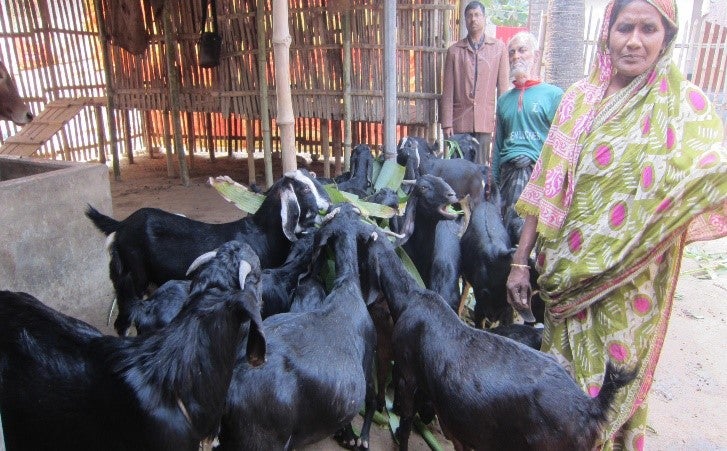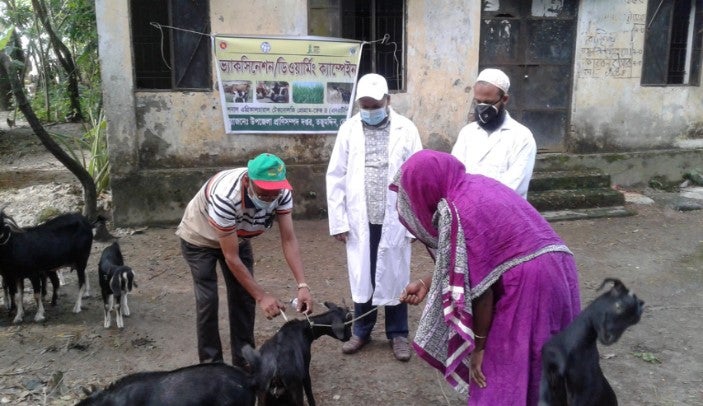 Goat farmer Bangladesh
Goat farmer Bangladesh
Masura Begum, a goat farmer in Raghurampur village, Bangladesh, used to lose up to 40 percent of her livestock due to preventable infectious diseases. In 2017, she received training on goat rearing practices through her village’s Common Interest Group (CIG) where she learnt the importance of preventing animal diseases through animal vaccination and deworming, improved farm hygiene, feeding and management. Masura loses less than 5 percent of her livestock now and is the proud owner of 45 adult goats, valued at BDT 210,000 ($2,700).
The smallholder livestock sector in Bangladesh provides livelihood opportunities for 70 percent of the rural population. Yet, the country has been unable to meet the population’s growing demand for meat and milk. One of the major factors impeding animal productivity is the high incidence of infectious diseases. Foot and Mouth Disease (FMD) alone, causes an estimated annual loss of around $125 million.
Animal disease control through vaccination is the most cost-effective way to reduce disease incidence and minimize economic losses. The impacts of animal vaccination in terms of nutrition and income security will be especially pronounced for marginalized and women livestock farmers – who are more resource poor than other farmers.
Livestock vaccination program
Three major factors determine the efficiency of animal vaccination programs: vaccine availability, vaccine access, and vaccine demand.
The World Bank and IFAD co-financed National Agricultural Technology Program Phase 2 (NATP2) works to ensure animal vaccine availability by facilitating local production at the Bangladesh Livestock Research Institute. The project also coordinates access by storing and supplying animal vaccines through the district and sub-district Livestock Offices, and, organizes mass animal vaccination and awareness campaigns through community agents, creating vaccine demand.
Since its inception, NATP2 has conducted over 38,000 campaigns, benefiting 14.4 million animals. This coverage is expected to expand through the World Bank supported Livestock and Dairy Development Project (LDDP), which aims to improve production and market access for 2 million farming households by stimulating private sector investment and developing livestock value chains.
Efforts during COVID-19
COVID-19 has badly hit the production and marketing of fresh animal products in Bangladesh, with small-scale farmers affected the most. Dissemination of inaccurate information, such as that chicken and other livestock could spread COVID-19, have had a negative impact on market demand.
In response, the government has activated an Emergency Action Plan to protect livelihoods and help business continuation for the most vulnerable in the livestock sector. The Department of Livestock Services also rapidly developed awareness campaigns to curb misconceptions about COVID-19 and undertook door-to-door animal vaccination programs to assure continued availability of services during the pandemic.
Sustainable animal disease control
Successful herd immunity to livestock diseases is possible by attaining herd immunity thresholds – a proportion of immune individuals in a population above which a disease may no longer spread vigorously. The successes and learnings of the animal vaccination program under NATP2 coupled with the envisioned activities of LDDP have the potential to inform and integrate other animal vaccination programs, thus offering maximum disease protection across the livestock herds in the country. For example, for Foot and Mouth Disease (FMD), vaccine coverage of 70-80 percent of the susceptible animal population will yield such threshold.
But given limited resources, manpower, and outreach, blanket disease control across the country in the short-term is a difficult proposition. Instead, a “zoning approach” should be considered where a disease-free zone within a country could be certified following the prescribed guidelines of the World Organization for Animal Health (OIE). The entire country then could be made disease-free in a phased manner. A zone-based disease control approach through an integrated and cooperative process, along with international and bilateral cooperation for important transboundary diseases, will lead to sustainable livestock disease prevention for Bangladesh.
The learnings from the successful animal vaccination programs implemented by the government can inform and be integrated into other animal vaccination programs, providing maximum disease protection across livestock herds in the country, ensuring more farmers like Masura Begum have their livelihoods protected.






Join the Conversation